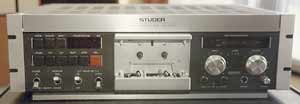The continuities and control room, I remember, had a wonderful expensive sort of smell, of cool air, cable, recording tape and warm electronics, seasoned with perhaps just a touch of dear old Ray Moore's lingering aftershave! I can still remember that smell to this day. What a wonderful place to have worked.
Before joining the BBC, I worked in my late schooldays, and whilst a university student, on a hospital radio station which was equipped with Spotmaster carts and those classic Philips mono tape machines - wonderful old transports, a joy to lace and to edit on. I replaced their old, near-useless, BSR domestic grams with a pair of ex-BBC RP2/1 units, which were based on the Garrard 301 turntable. These we mounted into the worktop and equipped with Shure SC35s and some old RP2/7 amps I came across. For many years this set-up did great service. Once you'd got used to anticipating the half-second or so delay as the turntable rose, you could drive a fast-moving music show with those, no problem at all. (The only minor flaw was that if you had the mic open and an otherwise silent background, the whirr of the "lift" motor was distinctly audible, despite attempts to "soundproof" the underside with bitumen-lined plywood boxes!)
As a schoolboy I'd learned a lot by myself by building amps and radios from stripped down TVs and ex-military junk. This, I was to find, gave me something of an unexpected edge over my colleagues and contemporaries. Unlike many of the (fairly young) engineers I worked with, I was very much at home repairing the older type B valve amps, some of which were, amazingly, still in front-line use in the control room. I'd often find a selection of the small grey boxes awaiting me in the morning, left by the previous Night Shift. (This was especially common following the infamous Generator Test, when brief loss of power in the wee small hours often seemed to push tottering amps over the edge!). Happiness was a quiet morning with a couple of these to fix, sustained by a hot cup of tea and a fresh jam doughnut from Joyce Rose's trolley outside the Control Room on the 1st floor.
Type D too was often gladly left for me to fix, being of discrete circuitry and requiring a level of comfort with the (by then) rather old-fashioned germanium transistor circuits that it used. One time I remember a particularly odd fault on a stereo D-type module, where the channel balance shifted when the gain was set high. This turned out to be due to the wrong resistor having been fitted during manufacture - it must've always been like that, and only got noticed one day when for the first time in its life the gain got cranked up! That one took me ages to find, and I don't think the boss believed me when I did!

Happy days....

